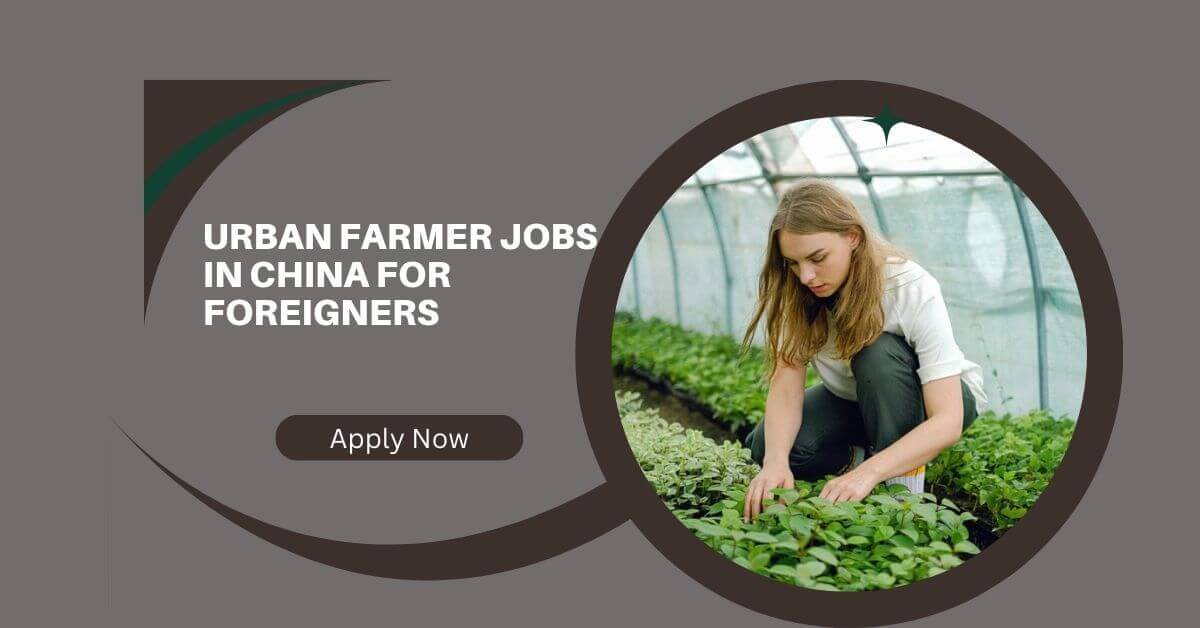Urban Farmer Jobs in China for Foreigners 2026 provide exciting opportunities for international applicants to work in sustainable agriculture, vertical farming, and urban food production. Salaries typically range from ¥8,000 to ¥20,000 per month, depending on experience, skills, and project type, offering competitive pay for foreign workers. These positions often include visa sponsorship, making it easier for qualified professionals to legally work and relocate to China. Employees gain hands-on experience in modern farming techniques, access to training programs, and opportunities for career growth in the booming urban agriculture sector. Additional benefits may include housing support, flexible work schedules, and the chance to contribute to sustainable food production and community development, making these roles ideal for motivated foreigners seeking a meaningful and impactful career in China.
What is Urban Farming?
Cultivating, processing, and distributing plants and livestock in urban settings is known as urban agriculture, urban farming, or urban gardening. To cultivate food (or any other crop) for themselves, urban communities redesign or repurpose their green spaces. It also includes several other occupations that produce food, such as fishing and forestry. In contrast, the term “rural farming” refers to the historical practice of employing rural areas for agricultural purposes. metropolitan farming uses many contemporary farming techniques, such as the use of apps, software, or sophisticated machinery, because metropolitan areas are centers of technology and commercialism.
Key Points:
- Job title: Urban Farmer/Agricultural Worker/ Farm Worker
- Location: China
- Visa Sponsorship: Yes/No
- Age limit: Minimum 18
- Free food: No
- Free Accommodation: As per the company’s policy
- Free transport: As per the company’s policy
- Free Medical: mostly yes.
Requirements:
1. Valid Work Visa
- Since urban farming falls under the category of specialized labor, candidates must get a valid Chinese skilled worker visa. The documentation process will be aided by the employer sponsoring the visa.
2. Valid Driving License
- It could be necessary to have a current driver’s license, particularly if the position entails moving equipment or items.
3. Experience in Urban Farming
- Urban farming expertise is usually necessary, though the specific company may have different requirements. Candidates with previous expertise in vertical farming or related agricultural industries may be taken into consideration by some employers.
4. Knowledge of Vertical Farming Techniques
- It is crucial to have a solid understanding of the many urban farming methods, especially vertical farming. Operating the specialized farming equipment utilized in these systems is part of this.
5. Communication Skills
- Since many Chinese urban farming businesses may interact with foreign teams or clients, having strong English communication skills is frequently necessary. To prove English language proficiency, a high school degree may occasionally be required. Proficiency may also be evaluated.
Read Also: Agriculture Jobs in Nuremberg Germany With Visa Sponsorship
Responsibility of an Urban Farmer:
In the field of urban agriculture, particularly in hydroponics and vertical farming, an urban farmer is essential. The primary duties for this position are listed below:
1. Harvesting and Packaging
- Select and package Harvesting vegetables and herbs on-farm guarantees that crops are picked at the ideal time to supply customers, including supermarkets and retailers, with the best quality produce.
- Reduce crop loss throughout the picking and packaging procedure to guarantee effective yield control.
2. Farm Cleanliness and Maintenance
- Maintain the cleanliness of in-store farms, ensuring that all areas are sanitized and organized in compliance with the company’s quality, safety, and environmental standards.
- Follow proper protocols for maintaining hygiene and preventing contamination.
3. Cultivating Crops Using Hydroponics
- Grow leafy vegetables and herbs with the company’s patented hydroponic growing apparatus.
- Utilize state-of-the-art indoor vertical farming methods to guarantee the best possible plant development and productivity.
4. Digital Reporting and Billing
- Use the Infarm app to record harvests, track crop yields, and report any issues with the vegetables or herbs. This ensures accurate tracking of inventory and yields.
- Manage daily billing for Infarm’s customers, ensuring accurate records of sales, including those from retailers and supermarkets.
5. Customer Feedback and Service Requests
- Report client comments and service requests in accordance with corporate guidelines, making sure that any problems with goods or services are resolved promptly and expertly.
Benefits:
Urban farming in China, especially in innovative sectors like vertical farming and hydroponics, offers a range of benefits for foreign workers. Here are the key advantages:
1. High Demand for Skilled Workers
- There is a constant need for qualified urban farmers in China as urban farming gains popularity, especially in cities where there is a rising demand for fresh products.
- Foreigners can find many career opportunities in the growing agriculture sector, particularly in technologically sophisticated farming practices and sustainable farming.
2. Competitive Salary
- In China, urban farmers receive competitive pay, especially for skilled laborers, and in certain situations, companies also offer housing stipends or accommodations.
- Working in innovative agricultural sectors can result in a steady income and opportunities for professional advancement.
3. Visa Sponsorship
- Visa sponsorship for skilled worker visas can help foreigners by making the process of acquiring a work visa to live and work in China simpler and more efficient.
4. Exposure to Advanced Farming Technologies
- China offers a great chance to experience cutting-edge agricultural technologies through urban farming, which employs modern methods including hydroponics and vertical farming.
- The development of skills is improved by this exposure, which facilitates entry into different agricultural or environmental fields around the world.
5. Cultural and Professional Experience
- Foreign urban farmers can fully immerse themselves in Chinese culture while working in China, both personally and professionally. Living in one of the fastest-growing economies in the world is an opportunity.
- Foreigners not only advance professionally but also acquire useful experience in a global workplace, which aids in the development of worldwide networks and relationships.
6. Contribution to Sustainability
- By lowering the carbon footprint involved in long-distance food transportation, urban farming is viewed as a sustainable method of growing food in urban settings. International laborers can be proud to support environmentally friendly practices and sustainable food production.
- You can contribute to solutions for the problems of climate change and global food security by working in the field.
7. Opportunities for Career Growth
- Opportunities for career progression in the agricultural or environmental industries are available to foreigners with experience in urban farming.
- Urban farmers can advance to more senior roles as sustainability consultants, farm managers, or agriculture technologists with experience.
8. Job Flexibility
- Jobs in urban farming, particularly those involving harvesting, packing, and other operational tasks, can offer flexible schedules. For employees trying to strike a balance between work and personal life, this can be really helpful.
9. International Work Experience
- Your employability in other worldwide agricultural markets can be improved by living and working in China, which can offer you invaluable foreign job experience and boost your professional profile’s credibility.
10. Accommodation and Benefits
- Particularly for those engaged in hands-on farming or residing in less urbanized areas, many businesses in urban farming provide free or heavily discounted housing to international workers.
- These positions are made even more alluring by the fact that health insurance and other perks are frequently included in the employment package.
Average Salary:
The typical pay for a farmer varies significantly depending on gender, geography, experience, and skill level. Nonetheless, a farmer in China usually makes about 35,00 JPY a month, according to Salary Explorer.
How to Apply for Urban Farmer Jobs in China for Foreigners?
Conclusion:
For foreigners hoping to progress in the agriculture industry, urban farming in China offers a special chance. These jobs are perfect for anyone looking to advance their careers in a dynamic, quickly developing nation because of the growing need for competent personnel, competitive pay, sponsorship for visas, and the opportunity to observe innovative farming methods. If you’re interested in hydroponics, vertical farming, or other cutting-edge farming methods, working in China can help you advance your career and support sustainability and global food security.
Frequently Asked Questions:
What is urban farming in China?
In order to produce fresh food for local markets, urban farming in China entails growing crops and rearing livestock in urban settings, frequently utilizing cutting-edge methods like hydroponics and vertical farming.
Do urban farmer jobs in China offer visa sponsorship?
Yes, many urban farmer positions in China provide visa sponsorship, especially for skilled workers, to help foreigners obtain the necessary work permits.






